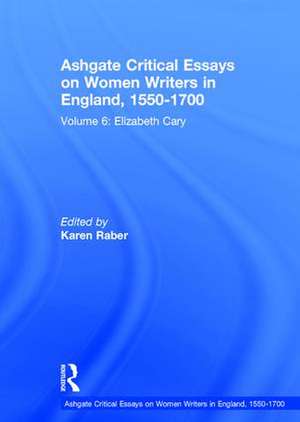Ashgate Critical Essays on Women Writers in England, 1550-1700: Volume 6: Elizabeth Cary: Ashgate Critical Essays on Women Writers in England, 1550-1700
Editat de Karen Raberen Limba Engleză Hardback – 19 aug 2009
Preț: 1728.55 lei
Preț vechi: 2297.74 lei
-25% Nou
Puncte Express: 2593
Preț estimativ în valută:
330.75€ • 346.26$ • 273.68£
330.75€ • 346.26$ • 273.68£
Comandă specială
Livrare economică 15-29 martie
Doresc să fiu notificat când acest titlu va fi disponibil:
Se trimite...
Preluare comenzi: 021 569.72.76
Specificații
ISBN-13: 9780754661009
ISBN-10: 0754661008
Pagini: 596
Dimensiuni: 169 x 244 x 42 mm
Greutate: 3 kg
Ediția:1
Editura: Taylor & Francis
Colecția Routledge
Seria Ashgate Critical Essays on Women Writers in England, 1550-1700
Locul publicării:Oxford, United Kingdom
ISBN-10: 0754661008
Pagini: 596
Dimensiuni: 169 x 244 x 42 mm
Greutate: 3 kg
Ediția:1
Editura: Taylor & Francis
Colecția Routledge
Seria Ashgate Critical Essays on Women Writers in England, 1550-1700
Locul publicării:Oxford, United Kingdom
Cuprins
Contents: Introduction; Selected bibliography; Part I The Life and/in the Work: Elizabeth Cary and The Tragedie of Mariam, Elaine Beilin; Resurrecting the author: Elizabeth Tanfield Cary, Donald W. Foster; The reproduction of mothering in Mariam, Queen of Jewry: a defense of 'biographical' criticism, Meredith Skura; A family affair: the life and letters of Elizabeth Cary, Lady Falkland, Heather Wolfe. Part II The Tragedy of Mariam, Fair Queen of Jewry: Genre: Valuing Mariam: genre study and feminist analysis, Nancy A. Gutierrez; Theaters, households, and a 'kind of history' in Elizabeth Cary's The Tragedy of Mariam, Rosemary Kegl; 'Profane stoical paradoxes': The Tragedie of Mariam and Sidneian closet drama, Marta Straznicky. Social and Political Contexts: Re-reading Elizabeth Cary's The Tragedie of Mariam, Faire Queene of Jewry, Dympna Callaghan; Reading, work and Catholic women's biographies, Frances E. Dolan; Allegories of imperial subjection: literacy as equivocation in Elizabeth Cary’s Tragedy of Mariam, Margaret W. Ferguson; Backbiters, flatterers, and monarchs: domestic politics in The Tragedy of Mariam, Heather E. Ostman; 'Counterfeit colour': making up race in Elizabeth Cary's The Tragedy of Mariam, Kimberly Woosley Poitevin; The Tragedy of Mariam: Cary's critique of the terms founding social discourses, Laurie J. Shannon. Part III The History of the Life, Reign and Death of Edward II: Reform or rebellion? The limits of female authority in Elizabeth Cary's The History of the life, Reign and Death of Edward II, Gwynne Kennedy; Gender and property: Elizabeth Cary and the History of Edward II, Karen Raber; Elizabeth Cary and Edward II: what do women want to write, Meredith Skura; Shaping a drama out of a history: Elizabeth Cary and the story of Edward II, Janet Wright Starner and Susan M. Fitzmaurice. Part IV Cary in Comparison: 'Ears prejudicate' in Mariam and The Duchess of Malfi, Reina Green; Insurgent flesh: epistemology and violence in Othello and Maria
Notă biografică
Karen Raber is Associate Professor English and Director of Graduate Studies at the University of Mississippi, USA.
Descriere
The essays included in this volume highlight the many evolving debates about Elizabeth Cary's works: their complicated generic characteristics, the social and political contexts they reflect, and the ways in which Cary's writing enters into dialogue with texts by male writers of her time. In its critical introduction, the volume offers a thorough analysis of where Cary criticism has been and where it might venture in the future.







